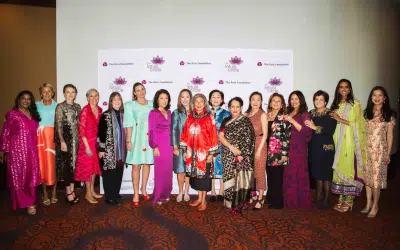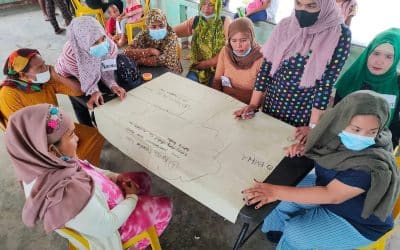InAsia
Insights and Analysis
Recalibrating Thai-U.S. Relations
August 29, 2018
The United States and Thailand are long-standing allies. It is somewhat remarkable that one of America’s oldest bilateral partners, with 185 years of official relations, is a Southeast Asian kingdom on the other side of the world. For Thailand, the United States has played a critical role in past moments of crisis, helping it, for example, to weather the storm of World War II by protecting Thailand from reparations and loss of territory at the war’s end. During the Cold War, Thailand was one of America’s closest Asian allies. A whole generation of Americans, from soldiers to scholars, worked with Thai counterparts during those times. My father, a U.S. Air Force captain stationed in Udon Thani in 1971, is among them.
But this special history appears to be fading with the passage of time. Since the end of the Cold War, instability in Thai politics, and America’s foreign-policy focus away from Asia, have profoundly affected U.S.-Thai relations. Unlike 40 years ago, the United States is no longer Thailand’s primary option for external partnerships. China is now Thailand’s largest trading partner, and Japan its largest foreign investor, with little prospect that the United States will regain its former status. Defense cooperation has always been the two nations’ strongest link, particularly since the defense agreements of 1954 and 1962. But today, Thailand has many more options for defense cooperation and procurement, and while joint exercises like the annual Cobra Gold are still going strong, a recent survey of Thai military officers has found a growing sense of distance.

Panelists at the Foundation-hosted bilateral dialogue between delegations of Thai and U.S. leaders in Washington, DC.
There is a broad consensus that U.S.-Thai relations need to find a new footing. The U.S. government’s recent adoption of the Free and Open Indo-Pacific strategy (FOIP) offers a chance to recalibrate. Growing geopolitical competition is shifting U.S. attention to Southeast Asia. Recent congressional legislation, such as the proposed Asia Reassurance Initiative Act, indicates a strong interest in shoring up old alliances. From the U.S. perspective, Thailand, a proven leader in ASEAN, is critical to a rules-based order in the region. From the Thai perspective, a strong U.S. presence is more important than ever to support Thailand’s traditional strategy of geopolitical balancing.
While the strategic context is conducive to stronger relations, there is an urgent need to inject new life into some key areas of cooperation. For the past year, The Asia Foundation has led a program to identify the areas most crucial to U.S.-Thai relations. We have worked with many of the leaders on both sides—diplomats, politicians, military officers, scholars, and business leaders—who shaped the relationship over previous decades, to have them share their insights and ideas. The program began with a study on current relations, based on 50 interviews with Thai and U.S. leaders. Then, in July, we organized a bilateral dialogue between delegations of Thai and U.S. leaders in Washington, DC.
The enthusiasm for this initiative has been apparent from the beginning. Many of the Thai leaders who were interviewed or joined the dialogue have a strong personal connection to the United States. Several have studied in the U.S.—in both civilian and military institutions—and have fond memories of their time there. Many expressed their opinion that this study was long overdue, and that similar analysis should be conducted more regularly to help Thai-U.S. relations evolve. On the U.S. side, many prominent academics and former government officials strongly agreed that such a program was long overdue. These American friends of Thailand have generally been concerned about the growing political distance and have many ideas for building on the lessons of these challenging recent years.
Not all of our interviewees were so enthusiastic. Some questioned the timing of the program, arguing that we should wait until after an election in Thailand. In Washington, some interviewees argued that Thailand’s priority and profile in U.S. foreign policy has waned, and that the administration was rightly investing in “newer” partners with more obvious shared strategic interests, such as Vietnam and Singapore. In Thailand, several interviewees spoke bitterly about Thailand’s treatment after the 2014 coup, arguing that the United States had a double standard—different, for example, than the one it applied to Egypt. We heard a play-by-play account of lines crossed and perceived U.S. missteps from several Thai leaders.
Our final report on the study and the outcomes of the bilateral dialogue is available here. These are some of the most valuable findings:
- Potential role of Thailand in shaping the Free and Open Indo-Pacific strategy (FOIP). Thailand welcomes renewed U.S. interest in Southeast Asia, but many Thai leaders are concerned they will be forced to choose between the U.S. and China. They are also concerned that the FOIP strategy makes little mention of Thailand specifically. During the dialogue, most U.S. and Thai participants acknowledged the importance of framing the strategy in a way that allows Thailand and other ASEAN countries to work with the United States without irritating China. Economic linkages have dramatically raised the stakes in relations with China, which is now the leading trade partner of every ASEAN country. Perhaps Thailand can play a constructive role in channeling ASEAN feedback to shape the FOIP and U.S. engagement in a productive way.
- Need for better ways to promote U.S. values of democracy and rule of law. Thai leaders broadly accept the importance of U.S. values in U.S. foreign policy, and the enduring appeal of those values. Some called U.S. promotion of democracy and the rule of law a strategic asset that will strengthen relations over the long term. But there was strong push-back from across the political spectrum against the way this has been done since 2014. Indeed, a separate study on the views of Thai young people found that a strong plurality of university students sees America’s values-based engagement as interference in Thai politics. The dialogue produced several suggestions for U.S. leaders and diplomats, including delivering criticism more discreetly and viewing democracy and rule of law more holistically—as something more than just elections.
- Digital technology and social media are the most promising areas for future economic and security cooperation. Thai and U.S. leaders agree that a renewed bilateral relationship must have an economic narrative. This is challenging given that the U.S. is falling behind nearby economic powers like China and Japan in manufacturing, investment, and trade—a trend that is unlikely to reverse. In the digital technology sector, however, there are plenty of opportunities for new partnerships. Thailand has enormous potential to accelerate growth and increase productivity through online applications and digital technology. In the past 18 months, more than 11 million Thais have become new internet users, mostly over smart phones, one of the fastest rates of mobile internet penetration in the world. The dialogue produced a set of actionable recommendations on cybersecurity cooperation and the risks of constraining data flows.
- Need for a new generation of leaders to invest in the Thai-U.S. relationship. One striking finding was the dwindling number of scholars, military officers, diplomats, and students focused on Thai-U.S. relations. In Thailand, we could not find a major Thai university with a U.S. Studies department, while nearly every university has a China Studies and an ASEAN Studies center or department. Several Thai leaders argued for the revitalization of the American Studies Association, which was once a leading actor in supporting scholars and officials interested in U.S.-Thai relations. Likewise, finding a Thailand expert in Washington is becoming more difficult with each passing year, as many of the old guard from the Vietnam War era are long retired. United States Senator John McCain’s recent passing was a stark reminder that the towering figures of that generation, who ensured that Southeast Asia had a prominent place in American foreign policy, will no longer be able to play this role.
- The Mekong River as a shared strategic interest. Many Thai leaders believe that the Mekong River should become a major area of shared strategic interest between Thailand and the United States. The stakes are high for Thailand and other lower-Mekong countries. Uncertainty over future water levels, concerns about blasting and dredging of the river bed, and the integrity of dams and other infrastructure are all major security and sovereignty concerns. While helpful, the U.S. Government’s Lower Mekong Initiative has been largely silent on these issues, and Thai leaders have been frustrated by the perceived lack of U.S. interest in the Mekong.
- U.S. foreign assistance losing its strategic relevance. The dialogue suggested several ways that U.S. foreign assistance can bolster U.S. influence and strengthen relations with Thailand and neighboring countries. Compared to China, Japan, India, and Australia, U.S. foreign assistance to the region contributes little to U.S. geopolitical ambitions and is generally felt to be driven by U.S. domestic priorities and internal bureaucratic processes. In contrast, other major aid providers tend to invest in the key priorities of regional governments—particularly connectivity through regional infrastructure—and to support existing mechanisms rather than create new programs.
- Thai elections are critical for Thai-U.S. relations to reach their full potential. U.S. leaders were clear, across the board, that successful Thai elections and a transition to democratic rule are crucial to a stronger relationship. In the absence of elections, the United States is politically and legally constrained. While not a major topic in the bilateral dialogue, this point came up repeatedly among U.S. officials and in interviews with U.S. leaders.
The Asia Foundation is grateful to all of the Thai and U.S. leaders who have been involved in this initiative that has yielded a set of productive findings. In the next edition of InAsia, we will bring you the views of two distinctive delegates to the dialogue.
Thomas Parks is The Asia Foundation’s country representative in Thailand. He can be reached at [email protected]. The views and opinions expressed here are those of the author, not those of The Asia Foundation.
1 Comment
About our blog, InAsia
InAsia is posted and distributed every other Wednesday evening, Pacific Time. If you have any questions, please send an email to [email protected].
Contact
For questions about InAsia, or for our cross-post and re-use policy, please send an email to [email protected].The Asia Foundation
465 California St., 9th Floor
San Francisco, CA 94104
The Latest Across Asia
News
April 25, 2024
Program Snapshot
April 18, 2024

2024 Lotus Leadership Awards
The Lotus Leadership Awards recognize contributions towards gender equality in Asia and the Pacific







Interesting report – hopeful that some resolution is reached. Compared to BRICS, and its growing influence in Asia and Africa, the current Thai government’s stance on a return to more democratic system, the dismal state of universal education in Thailand,
and the current myopia of American foreign policy initiatives and even interests, I’m concerned that relations won’t have much of a chance